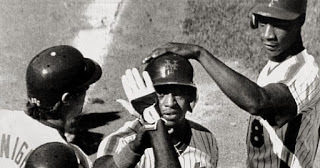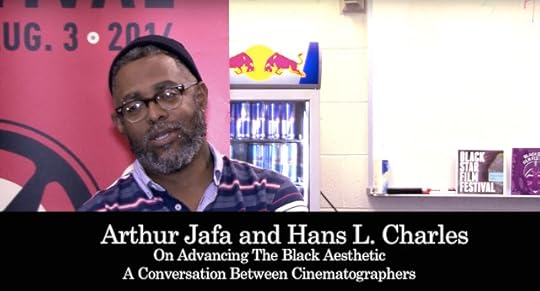Mark Anthony Neal's Blog, page 683
October 28, 2015
Project Bronx: 5 Reasons Obama is Puerto Rican--on the PR Debt Crisis
 '+ProjectBronx gives 5 reasons why Barack Obama is "Puerto Rican"as a means to discuss the Puerto Rico crisis and the fact that the US government is playing political games with the island Puerto Rico.'
'+ProjectBronx gives 5 reasons why Barack Obama is "Puerto Rican"as a means to discuss the Puerto Rico crisis and the fact that the US government is playing political games with the island Puerto Rico.'
Published on October 28, 2015 19:35
NewBlackMan (in Exile): Our Top-5 Favorite New York Mets
 NewBlackMan (in Exile): Our Top-5 Favorite New York Mets
NewBlackMan (in Exile): Our Top-5 Favorite New York MetsI stayed up well past my bedtime, to watch the New York Mets lose game one of the 2015 World Series. I was a toddler when the Amazin’ Mets won the World Series in 1969, by the time they returned to the Series in 1973, amidst Tug McGraw’s chants of “Ya Gotta Believe” I was a seven-year-old lifer. There was no way I wasn’t staying up to watch all 14-innings of Game One, and though I was disappointed by the lose, there was some joy in watching 42-year-old (so we think) Bartolo Colon still compete with the young boys. Well past his prime, Colon has become my favorite player in this collection of Mets, watching him call on experience, craft, and guile to play a game dominated by men, 15-years his junior (so we think).
Here’s a top-5 list of my favorite New York Mets players over the years

Folk either loved or hated Jose Reyes, given his endless trips on the DL and what now clearly is un-reached potential. Reyes along with David Wright (and Darryl Strawberry a generation earlier) was one of the best position players ever developed from the Mets’ farm system. Even a decade ago, though, you knew that Wright would retire a Met and Reyes would always be in his shadow (and on another team). Never saw a player play the game with the sheer joy that Reyes did; when he was healthy he was brilliant.
 Lee Mazzilli was the “star” on some classically bad teams in the late 1970s and early 1980s (many of which managed by Joe Torre before he became a “genius” with the Yankees). At his best, Mazzilli would have been a middling regular who could run the bases, make a stylish Willie Mays inspired basket-catch, and pop a few homers (like he did in the 1979 All-Star Game). What made Mazzilli matter was that he was a New Yorker, and in an era when you couldn’t walk out the house and claim you were a Met fan without being met with thunderous laughter, dude dared think he was a star in city then dominated by Steinbrenner’s first cohort of Yankees--led by Reggie Jackson. Best Mazzilli moment? Him getting into a shouting match with pitcher Al Hrabosky, hitting a homerun off dude, touching home-plate, handing his spectacles to the bat boy, and then charging the mound to beat some ass. If you were gonna be a New York Met in the late 1970s, you had to at least be a bad ass.
Lee Mazzilli was the “star” on some classically bad teams in the late 1970s and early 1980s (many of which managed by Joe Torre before he became a “genius” with the Yankees). At his best, Mazzilli would have been a middling regular who could run the bases, make a stylish Willie Mays inspired basket-catch, and pop a few homers (like he did in the 1979 All-Star Game). What made Mazzilli matter was that he was a New Yorker, and in an era when you couldn’t walk out the house and claim you were a Met fan without being met with thunderous laughter, dude dared think he was a star in city then dominated by Steinbrenner’s first cohort of Yankees--led by Reggie Jackson. Best Mazzilli moment? Him getting into a shouting match with pitcher Al Hrabosky, hitting a homerun off dude, touching home-plate, handing his spectacles to the bat boy, and then charging the mound to beat some ass. If you were gonna be a New York Met in the late 1970s, you had to at least be a bad ass.  Cleon Jones is more my daddy’s choice than mine, though dad would have gone with Tommie Agee, who I did not get to see in his prime. Jones’s knee problems had robbed him of his natural gifts before I laid eyes on him on a regular basis, but his mother named him Cleon and his last name was Jones, and I had the sense enough to know that there was some significance to him being the team’s only regular Black ballplayer in the early 1970s. Jones was also the initial source of my on-going ambivalence about the team’s history with Black ballplayers. After Jones was found naked in a van with a White women early in the morning during Spring Training of 1975, he was given the biggest team fine ever and forced by team chairman M. Donald Grant to publically apologize about his infraction. Not sure Tom Seaver, Buddy Harrelson or Jerry Koosman, would have have experienced the same fate.
Cleon Jones is more my daddy’s choice than mine, though dad would have gone with Tommie Agee, who I did not get to see in his prime. Jones’s knee problems had robbed him of his natural gifts before I laid eyes on him on a regular basis, but his mother named him Cleon and his last name was Jones, and I had the sense enough to know that there was some significance to him being the team’s only regular Black ballplayer in the early 1970s. Jones was also the initial source of my on-going ambivalence about the team’s history with Black ballplayers. After Jones was found naked in a van with a White women early in the morning during Spring Training of 1975, he was given the biggest team fine ever and forced by team chairman M. Donald Grant to publically apologize about his infraction. Not sure Tom Seaver, Buddy Harrelson or Jerry Koosman, would have have experienced the same fate.  Hubie Brooks came through the Mets farm system, making his debut in 1980, a few months before Mookie Wilson. He was never a great player, though he put up some big RBI numbers after he was traded from the Mets in the trade that brought the late Gary Carter to the team. Brooks’ claim the fame was that for a four year-period he was the Mets regular third-baseman--a position that was historically a black-hole for the team--becoming one of the longest tenured third-basemen on the team until Mr. Wright took the position in 2005. In a city that adored bright lights, Brooks was a lunch-pail dude, that in many ways made his more accessible to fans than his more talented peers, Misters Strawberry and Gooden. That work ethic earned him 14-years in the league.
Hubie Brooks came through the Mets farm system, making his debut in 1980, a few months before Mookie Wilson. He was never a great player, though he put up some big RBI numbers after he was traded from the Mets in the trade that brought the late Gary Carter to the team. Brooks’ claim the fame was that for a four year-period he was the Mets regular third-baseman--a position that was historically a black-hole for the team--becoming one of the longest tenured third-basemen on the team until Mr. Wright took the position in 2005. In a city that adored bright lights, Brooks was a lunch-pail dude, that in many ways made his more accessible to fans than his more talented peers, Misters Strawberry and Gooden. That work ethic earned him 14-years in the league.  Tom Seaver was the first homegrown Mets player to be elected to the Hall of Fame; I was honored that I got to see him every five days when he was in his peak. I was too young to have seen Koufax or Gibson in their primes; Seaver was simply the best major league pitcher that I had seen, and the fact that he pitched for my team, was no small matter. Hell in pickup games, I even tried to emulate that back-leg push that was the signature of all the Mets pitchers that came up through the system then: Koosman, Matlack, Gentry, and of course Ryan. If there is an oft-remembered scene from my childhood, it’s watching Seaver on a Sunday with my dad.
Tom Seaver was the first homegrown Mets player to be elected to the Hall of Fame; I was honored that I got to see him every five days when he was in his peak. I was too young to have seen Koufax or Gibson in their primes; Seaver was simply the best major league pitcher that I had seen, and the fact that he pitched for my team, was no small matter. Hell in pickup games, I even tried to emulate that back-leg push that was the signature of all the Mets pitchers that came up through the system then: Koosman, Matlack, Gentry, and of course Ryan. If there is an oft-remembered scene from my childhood, it’s watching Seaver on a Sunday with my dad.
Published on October 28, 2015 11:50
Forget the Bacon: Living in Poverty Means You Have An Advanced Risk of Getting Cancer
 Forget the Bacon: Living in Poverty Means You Have An Advanced Risk of Getting Cancer
by Lawrence Ware + Rebecca Martinez | NewBlackMan (in Exile)
Forget the Bacon: Living in Poverty Means You Have An Advanced Risk of Getting Cancer
by Lawrence Ware + Rebecca Martinez | NewBlackMan (in Exile)The World Health Organization recently released a press statement on the carcinogenicity of the consumption of red meat and processed meat. The statement, which elicited media headlines comparing eating hot dogs to smoking cigarettes, reported findings from a group of 22 global experts examining more than 800 studies to evaluate the association between cancer and consumption of red meat and processed meat.
Unlike the frenzied headlines that misunderstand cancer risk and classification, the actual WHO statement reported on carcinogenic (potential cancer causing) classifications, not the magnitude of risk. Specifically, they classified processed meat as carcinogenic to humans (Group 1) because of the numerous studies with similar findings linking consumption to colorectal cancer. Because processed meat is now classified alongside cigarette smoking in Group 1, the inevitable confusion results with people assuming that smoking cigarettes is comparable to eating sandwich meat.
Meat, unlike cigarettes, has nutritional value and to make flippant comparisons between the two is not helpful, but in fact adds confusion to dietary recommendations. The research supports much of what has been already stated about limiting meat consumption, but it does not point to radically altering people’s diets based on this information.
Yet, one question remains. What does this mean for those living in poverty?
In 2014, over 14% of Americans were living in poverty. When you isolate for age, you discover that over 20% of children are living at or below the poverty line. Much has been said about food insecurity among those who are living in impoverished conditions, but more needs to be said about the quality of foods accessible to those living in these conditions.
When money is scarce, many families eat inexpensive foods that are either processed or high in preservatives. Low-income neighborhoods usually lack grocery stores and farmers markets where fresh fruits and vegetables are readily available. Further, if these neighborhoods do, indeed, have full service grocery stores or farmers markets, healthy food is more expensive. According to the Food Research and Action Center:
Households with limited resources to buy enough food often try to stretch their food budgets by purchasing cheap, energy-dense foods that are filling – that is, they try to maximize their calories per dollar in order to stave off hunger. While less expensive, energy-dense foods typically have lower nutritional quality and, because of overconsumption of calories, have been linked to obesity
This means that many families living at or below the poverty line have a higher risk of being obese and/or developing type-2 diabetes. We’ve known this for quite some time. Now there is growing concern surrounding poverty and cancer.
It was common knowledge that there is a correlation between the consumption of processed foods and cancer, but now the WHO announcement concretized that correlation by using language that talks about these foods in ways similar to how they discuss cigarettes. To be sure, those living in poverty are not the only ones that consume bacon, ham, and other processed meats. However, if you are poor, there is a higher chance that you will. This should create a crisis of conscious among those concerned about poverty in this country. Instead it inspired moralizing on the part of vegans and vegetarians.
Instead of going on social media and pontificating from a position of middle to upper-middle class privilege, social justice advocates need to take a hard look at barriers to health among those living in poverty. 16 million children are at or below the poverty line in America. That’s more than 1 in 5.
What the poor among us need are social changes and governmental policies that give them access to high quality foods—not sermonizing or self-congratulatory behavior on the part of vegans, vegetarians, pescatarians, and petite bourgeois foodies. Whether it's about cigarette smoking or eating meat, moral prescriptions for health that shame rather than understand individuals is never a good public health approach.
Even the images used to communicate the cancerous potentiality of the meat was grounded in classism; pictures of ‘poor people food’ like hot dogs and greasy dollar menu hamburgers were used to warn the general populace. Simply google “processed meats and cancer” to view the images associated with this warning.
The media’s focus on comparing (both visually and verbally) the eating of processed meat to smoking cigarettes is even more questionable when the comparison to another Group 1 carcinogen, alcohol, seems like a more accurate comparison.
According to the American Cancer Society (ACS), seven (and possibly 8) types of cancer are linked to alcohol consumption, and for each of these cancers, just as with the consumption of processed meats, the risk increases with the amount consumed. Decreasing alcohol consumption is often recommended, for example, to reduce women’s risk of breast cancer, but halting alcohol consumption altogether is not typically suggested. The same recommendation is made for processed meat consumption.
Cigarette smoking, on the other hand, is not only linked to 14 types of cancer, according to the ACS, but there are no recommended levels for “safe” or less risky consumption. As the ACS website notes, “even smoking as few as 1 to 4 cigarettes a day can lead to serious health outcomes.” The ACS website points out that no levels of cigarette smoking are safe due to the addictive qualities of nicotine.
So why do media outlets compare the consumption of processed meats and cigarette smoking as Group 1 carcinogens when alcohol consumption might be a more logical comparison? Again, because moralizing health around class based behaviors is a common practice both within public health and in the broader media. We must be careful about how we discuss and represent health messages to avoid embedding our societal biases into prescriptions for health.
We have a health crisis in this country. Obesity, diabetes and cancer are ravishing disadvantaged communities. Too often this crisis is centered in personal responsibility, but we must also look at systemic conditions lest we blame the victims of poverty without equipping them with the tools necessary for positive health outcomes.
+++
Rebecca Martinez is an Assistant Professor in the Department of Women's and Gender Studies at the University of Missouri. She is a medical anthropologist whose research encompasses issues of race, ethnicity, class, gender as related to cancer and reproductive health.
Lawrence Ware is a professor of philosophy and diversity coordinator for Oklahoma State University’s Ethics Center. A frequent contributor to the publication The Democratic Left and contributing editor of the progressive publication RS: The Religious Left, he has also been a commentator on race for the HuffPost Live, CNN, and NPR.
Published on October 28, 2015 08:50
October 27, 2015
Families On Lockdown: The True Cost Of Mass Incarceration
 'When a person is sent to prison, they aren't the only one who pays for the crime. +AJ+ speaks with families burdened by mass incarceration in America.'
'When a person is sent to prison, they aren't the only one who pays for the crime. +AJ+ speaks with families burdened by mass incarceration in America.'
Published on October 27, 2015 13:10
October 26, 2015
Vocalo: BJ The Chicago Kid On The Chicago Sound
 'Reclaimed Soul's Ayana Contreras talks with Motown recording artist (and Chicago native) BJ the Chicago Kid. BJ talks about his roots and carrying "the Chicago Thing" forward into the 21st Century.' --
Vocalo
'Reclaimed Soul's Ayana Contreras talks with Motown recording artist (and Chicago native) BJ the Chicago Kid. BJ talks about his roots and carrying "the Chicago Thing" forward into the 21st Century.' --
Vocalo
Published on October 26, 2015 18:55
Wendell Pierce: Hurricane Katrina--Good for Business, Bad for People
 'The media treated the ten-year anniversary of Katrina with reverence. Wendell Pierce argues that they should have been hard at work exposing the ugliness which still remains. Pierce's new book is
The Wind in the Reeds: A Storm, A Play, and the City That Would Not Be Broken
.'
'The media treated the ten-year anniversary of Katrina with reverence. Wendell Pierce argues that they should have been hard at work exposing the ugliness which still remains. Pierce's new book is
The Wind in the Reeds: A Storm, A Play, and the City That Would Not Be Broken
.'
Published on October 26, 2015 18:14
Ben Carson Keeps Saying The Darndest Things
 'Dr. Ben Carson is leading the polls for the Republican presidential nomination in Iowa, but he keeps on creating controversy with the things he says. This time he compared being pro-choice to those who were pro-slavery.' -- @AJ+
'Dr. Ben Carson is leading the polls for the Republican presidential nomination in Iowa, but he keeps on creating controversy with the things he says. This time he compared being pro-choice to those who were pro-slavery.' -- @AJ+
Published on October 26, 2015 18:07
ReelBlack--Arthur Jafa + Hans L. Charles on Advancing A Black Aesthetic
 '"Can Black Film exist within the structure of the Hollywood System?" Cinematographers and Howard University alums Arthur Jafa (Crooklyn, Daughters of The Dust) and Hans L. Charles (assistant camera on Pariah, Gun Hill Road, Middle of Nowhere) sat down with RBTV at the 2014 BlackStar Film Festival to talk about how to advance a Black Aesthetic in Motion Pictures.'
'"Can Black Film exist within the structure of the Hollywood System?" Cinematographers and Howard University alums Arthur Jafa (Crooklyn, Daughters of The Dust) and Hans L. Charles (assistant camera on Pariah, Gun Hill Road, Middle of Nowhere) sat down with RBTV at the 2014 BlackStar Film Festival to talk about how to advance a Black Aesthetic in Motion Pictures.'
Published on October 26, 2015 09:48
Simone Browne--Dark Sousveillance: Race, Surveillance and Resistance [Lecture]
 Simone Browne's
lecture "Dark Sousveillance: Race, Surveillance and Resistance" was hosted at the Graduate Center, CUNY by the Digital Praxis Seminar and the CUNY Digital Humanities Initiative. Browne is the author of
Dark Matters: On the Surveillance of Blackness
(Duke University Press).
Simone Browne's
lecture "Dark Sousveillance: Race, Surveillance and Resistance" was hosted at the Graduate Center, CUNY by the Digital Praxis Seminar and the CUNY Digital Humanities Initiative. Browne is the author of
Dark Matters: On the Surveillance of Blackness
(Duke University Press).
Published on October 26, 2015 09:36
October 25, 2015
Marco Pavé -- "Black Tux" from 'Perception'
Published on October 25, 2015 20:02
Mark Anthony Neal's Blog
- Mark Anthony Neal's profile
- 30 followers
Mark Anthony Neal isn't a Goodreads Author
(yet),
but they
do have a blog,
so here are some recent posts imported from
their feed.




